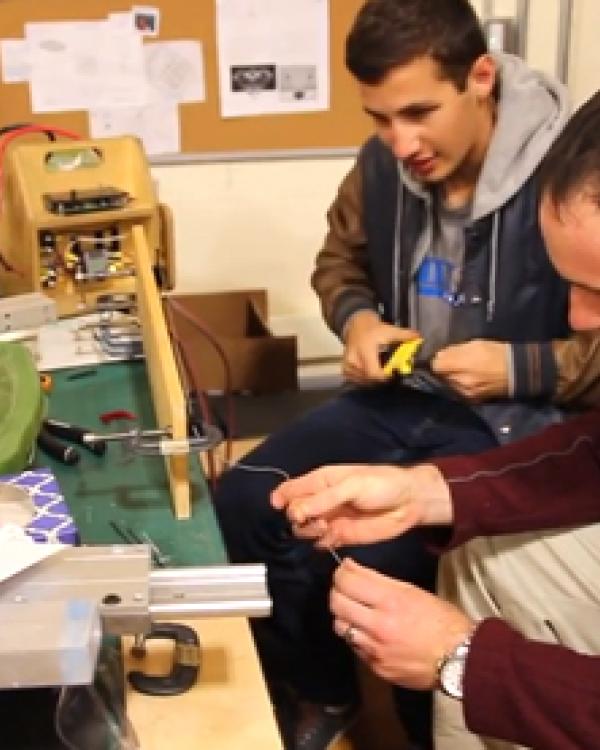
A TEP credential candidate working with a student at the Dos Pueblos Engineering Academy
The California Commission on Teacher Credentialing (CTC) has approved the Teacher Education Program (TEP) at UC Santa Barbara to prepare teacher candidates for the Industrial Technology (ITE) credential. Such a credential works hand-in-hand with the secondary school physics science credential to broaden a teacher’s area of knowledge and provide practical learning opportunities for high school students.
“This new credential came about because of the dedication of our K-12 partners to prepare teachers who are ready for 21st century students’ needs,” says Teacher Education Program Director Tine Sloan. “Dos Pueblos teachers Kristen Ritter and Amir Abo-Shaeer contacted us about creating a special pathway for physics candidates to earn the industrial technology credential within the Dos Pueblos Engineering Academy. This is a tremendous opportunity for our science candidates and it makes our already strong STEM preparation yet stronger.”
Teacher candidates in the ITE program will complete a placement at Dos Pueblos Engineering Academy (DPEA), part of Dos Pueblos High School. DPEA is a high school engineering program in Goleta, California, nationally known for its high quality of work as evidenced by their success in many years of FIRST robotics competition. The mission of the DPEA is to provide 21st century skills through project-based learning in science, technology, engineering, art, and mathematics. In this placement candidates will get hands-on practicum experience with computer-aided design and machine shop manufacturing.
The California Commission on Teacher Credentialing states: “The basis for the ITE subject matter requirements and standards is a core of study that establishes the ‘nature of technology.’ The content areas of power and energy, information and communication, and project and product development surround this core. The common nature of these areas of technology allows prospective teachers to study any content area and understand the basic principles of the other technology content areas. Through thematic organization of the content, prospective teachers study the relationships and principles using different technologies. Further, each of the content areas overlaps with different industry sectors (i.e., engineering and design, building trades and construction, manufacturing and product development, energy and utilities, and transportation).”
Both UCSB's Teacher Education Program and its School Psychology program received full re-accreditation with notable accolades included in the official report after their 2011 California Commission on Teacher Credentialing review. TEP offers a rigorous, 13-month, post-graduate M.Ed.+Credential program (an academic year with 2 summers). It is one of the highest quality programs in the nation, with state-of-the art practice grounded in partner schools, a focus on teaching to reach ALL learners, and teacher educators with established records of success. TEP works with one cohort of teacher candidates per year and keeps the program small to ensure individualized attention for each teacher candidate (approximately 100 candidates). Course- and field-work is concurrent, which means candidates spend the entire academic year in schools, developing their practice with daily guidance, then extending their learning in afternoon/evening courses. This allows for a more streamlined, purposeful integration of university and fieldwork, which drives our faculty to collaborate across all aspects of teacher preparation. TEP strives for a community of learners where everyone – teacher candidates, teacher educators, and K-12 teachers – are working together to meet the needs of our new, our diverse, and our very different generation of learners.
TEP offers a Multiple Subject Teaching Credential for elementary school teachers; a Single Subject Teaching Credential for junior high or high school teachers in: English, Math, Social Science, World Language (French, German, Latin, and Spanish), Science (Biology, Chemistry, Earth Science, and Physics), and Industrial Technology; and, an Education Specialist Moderate/Severe Teaching Credential for special education teachers.